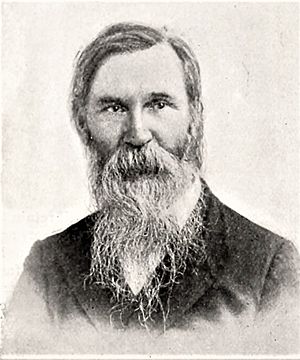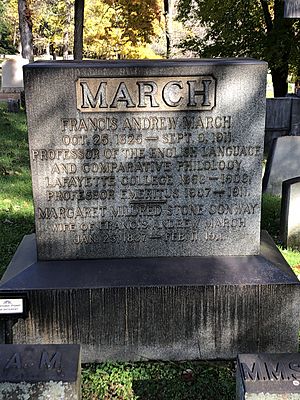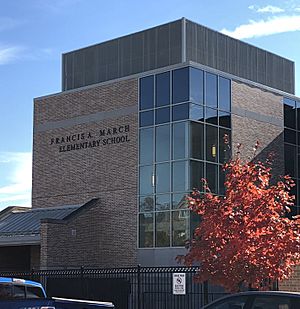Francis March facts for kids
Quick facts for kids
Francis Andrew March
|
|
|---|---|

An 1895 illustration of March
|
|
| Born | October 25, 1825 Millbury, Massachusetts, U.S.
|
| Died | September 9, 1911 (aged 85) Easton, Pennsylvania, U.S.
|
| Citizenship | United States |
| Alma mater | Amherst College |
| Occupation | Professor, Lafayette College |
| Known for | Founder of modern comparative linguistics First professor of English in a University setting |
| Board member of | President of the American Philological Association (1873–1874; 1895–1896) President of the Modern Language Association (1891–1893) |
| Spouse(s) | Margaret Mildred Stone Conway (m. 1860) |
| Children | 9, including Peyton C. March |
| Signature | |
Dr. Francis Andrew March (born October 25, 1825 – died September 9, 1911) was an American scholar who knew a lot about many subjects. He was a philologist, meaning he studied languages and their history. He was also a lexicographer, someone who writes dictionaries.
Many people see him as the main founder of modern comparative linguistics (comparing languages) especially for Old English. He was known as the "Grand Old Man of Lafayette" because he taught there for 56 years. He was also the first person in the United States or Europe to be called a "Professor of English Language and Literature."
Contents
Francis March's Early Life and School
Francis March was born on October 25, 1825, in a town called Sutton, which is now part of Millbury, Massachusetts. When he was three, his family moved to Worcester, Massachusetts. He went to public schools in Worcester.
March was very thankful for his early teachers. He said his kindergarten teacher helped children understand things sooner than usual. This prepared him well for high school. There, he was a smart and active student. He enjoyed writing, reading many different books, and even performing in and writing school plays.
Going to College: Amherst
When March was 15, he was ready for college. However, his father had money problems, making it hard to pay for tuition. Luckily, a kind man named Alfred D. Foster offered to help pay for his education at Amherst College.
At college, March was excellent in both his studies and sports. He graduated in 1845 at the top of his class. He also earned a master's degree from Amherst in 1848. During his time at Amherst, he became interested in studying Anglo-Saxon because of Noah Webster.
Francis March's Career Journey
After graduating from Amherst, March started teaching. He first taught at an academy in Swanzey, New Hampshire. Then, he taught for two years at Leicester Academy. It was there that he began to plan how he would teach English and literature. From 1847 to 1848, he worked as a tutor at Amherst College.
Trying Out Law
March was also interested in law. In 1849, he started studying law. A year later, he became a lawyer in New York. He began working with a partner.
However, in 1852, March became very sick with lung problems. He traveled to Cuba, hoping the warmer weather would help him. The climate did help, and he was able to work again the next year. He found a job teaching law at a private school in Fredericksburg, Virginia, for three years.
Teaching at Lafayette College
After studying law and teaching, March became an English tutor at Lafayette College in Easton, Pennsylvania, in 1856. He was hired by the college's new president. After one year as a tutor, he became a professor of English Language and Comparative Philology in 1857. He held this position until 1907.
Lafayette College was the first college in the world to offer a course on the philology of the English language. Soon after, other American colleges started adding similar courses. March was the first person to have the title "Professor of English Language and Literature" anywhere in the U.S. or Europe. He also became the college's first librarian.
March had a very important career at Lafayette College. He stayed loyal to the school, even turning down job offers from bigger universities. He helped make Lafayette a more respected college. He wanted to improve how English literature was studied in colleges. Besides English, March also taught many other subjects. These included French, German, Greek, Latin, botany, mental philosophy, political economy, and law.
March changed how English was taught. He introduced a detailed way of looking at language and writing. By using the same methods to study English literature as people used for Latin and Greek classics, he started the first scientific study of the English language. He was also the first to include a play by William Shakespeare on his course list. March believed in a special way of studying English. His ideas were called "the greatest pioneering step ever made in the realm of scholarship by Lafayette College."
March's son also became an English professor at Lafayette, and they worked together. Francis A. March's dedication to Lafayette College and his ideas about studying English are still a part of the college's teaching philosophy today.
March's Academic Work
Outside of teaching, Francis A. March made many important contributions to philology. He wrote over 200 articles for magazines and journals. These articles were about language history, teaching literature, and how to teach. He also published four books of Latin and Greek classics.
His Masterpiece: Anglo-Saxon Grammar
In 1869, he published his most famous work, "A Comparative Grammar of the Anglo-Saxon Language." This book made him known as a top scholar in the world of language studies. He was president of the American Philological Association twice. Later, in 1903, he published "A Thesaurus Dictionary of the English Language."
Spelling Reform Efforts
March was a key leader in changing how English words are spelled. He believed in simpler spellings. In his own writing, he often spelled words the way they sound to show his support for spelling reform. From 1876 to 1906, he was the permanent President of the Spelling Reform Association.
Working on Dictionaries
March was also interested in Lexicography, which is the art of writing dictionaries. He was influenced by Noah Webster, who wrote a famous dictionary. March believed that spelling and grammar should be based on how words are spoken.
He was the first American leader for the volunteer reading program of the Oxford English Dictionary. He gave great help to James Murray in putting together this huge dictionary. He also worked as a consulting editor for another dictionary, Funk and Wagnalls' Standard Dictionary.
Francis March's Family Life
Francis March married Margaret Mildred Stone Conway on August 12, 1860. They had nine children together. Some of his children also became successful.
- His son, Francis Andrew March Jr., became a history professor at Lafayette College.
- Another son, General Peyton C. March, was the chief of staff for the United States Army during World War I.
- Thomas Stone March became a school superintendent.
- Alden March became a Sunday editor for The New York Times.
- John Lewis March became a professor of modern languages.
March's Final Years

Francis A. March passed away on September 9, 1911, at age 86. He died at his home on the Lafayette College campus. He is buried in Easton Cemetery in Northampton County, Pennsylvania. A few years after his death, his friend and colleague, Professor James Bright, gave a speech honoring him.
Francis March's Lasting Legacy
March worked at Lafayette College for over fifty years. He chose to stay there, even though he had chances to go to other universities. He wanted to keep studying, teaching, and publishing at the small liberal arts school.
March is remembered for being the first scholar in the country to study and teach English texts in the same way professors taught Greek and Latin classics. His work led Lafayette College to create the first special position in any U.S. college for studying English texts from a modern point of view.
Lafayette College still has a special professorship named in March's honor. They also have a Francis A. March Fellowship. This award goes to a senior student who has done very well in the English department and is going to graduate school. March's colleague, James A. Bright, also said that March helped shape the Lafayette College community. He was good at building relationships with teachers and guiding students.
March's impact can also be seen in the wider Easton, Pennsylvania, community. An elementary school there is named after him: Francis A. March Elementary School.
The larger academic world also recognizes March's important work. Each year, the Modern Language Association gives two awards named after Francis A. March to honor great scholar-teachers. The Association of Departments of English also has the Francis Andrew March Award. This award honors scholars who have made huge contributions to the study of English.
Achievements and Special Honors
Francis A. March's important works have been highly recognized in the academic world. He was the first to hold the title of "Professor of English Language and Literature" in both the United States and Europe. This appointment was called "the greatest pioneering step ever made in the realm of scholarship by Lafayette College."
He was elected president of several important groups:
- The Modern Language Association (1891 to 1893)
- The American Philological Association (1873 to 1893 and 1895 to 1896)
- The Spelling Reform Association (1876 to 1905)
He was also the vice president of London's New Shakspere Society.
March was the first American member of London's Philosophical Society and Paris's L’Association Fonetique de Professeurs de Langues Vivants. In 1878, he was chosen as a member of the American Philosophical Society. In 1881, March was elected into the American Antiquarian Society. Members are chosen by their peers for their great contributions to learning.
During his 56 years at Lafayette College, March received several honorary degrees from famous universities.
- In 1870, Princeton University gave him the degree of Legum Doctor (LL.D).
- In 1887, Columbia University honored March with the degree of Doctor of Humane Letters (D.H.L.).
- In 1896, he received two more degrees: Doctor of Civil Law (D.C.L.) from the University of Oxford and Doctor of Letters (Litt.D) from the University of Cambridge. At that time, March was one of only six people ever to receive such high honors from these universities.


